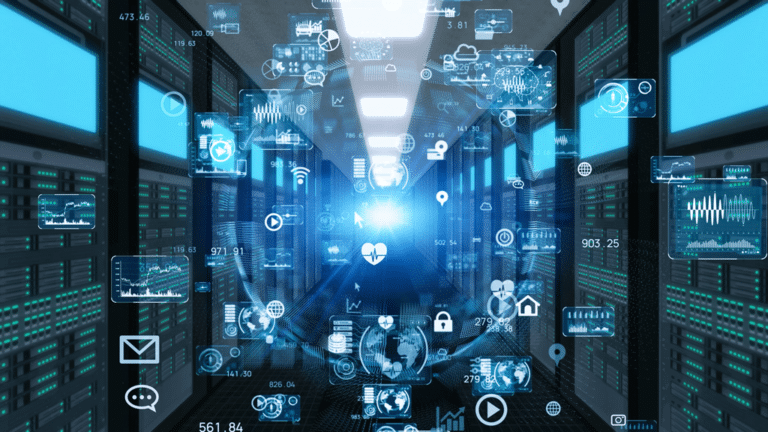The road to carbon neutrality has included a series of milestones that paved the way for green data centres. In 2015, the Paris Agreement was adopted by 196 countries and began serving as a framework for new countermeasures in the fight against climate change. Its main goal is to achieve a carbon-neutral world in the twenty-first century, where a balance is realised between the amount of carbon dioxide emitted and the amount of carbon dioxide absorbed from the atmosphere.1
The United Nation’s SDGs (Sustainable Development Goals) were born around the same time, with one of the 17 goals conceived to ensure access to affordable, reliable, sustainable and modern energy for all. Electric power is a critical resource for data centres, which are fundamental components of digital infrastructure, and moving forward, these facilities will need to adapt to a new era and become green data centres, where power consumption is strictly managed with environmental goals in mind.
Mitsubishi Electric has a wealth of experience as a manufacturer of multiple infrastructural components. The company’s integration with a wide variety of existing and new systems provides a unique perspective on how green data centres can save energy and bring new value. What’s more, Mitsubishi Electric technology, based on decades of eliminating harmful substances and recycling manufacturing materials, allows Mitsubishi Electric to realistically envision potential performance.
Green data centres are critical for a sustainable future
ICT and the rapid digital transformation of businesses, including the adoption of IoT (Internet of Things), put data centres, which form the digital infrastructure behind everything, under immense pressure. The service life of a data centre typically spans between ten and twenty years, which means that the data centres built in the 2000s to support the rapid popularisation of computers and networks are now reaching the end of their lifespans.
The modern mindset about global environmental issues is changing, and future data centres are expected to implement specific measures that take this into account. At the same time, international awareness of environmental issues is increasing, and data centres built in the future will be required to take concrete measures. One indicator for evaluating the environmental friendliness of a data centre is by using the value PUE (Power Usage Effectiveness), which is the ratio of the total amount of power used by a facility to the amount of electric power consumed by the IT equipment. A decade ago, PUE levels were at 2.0 or higher.
This indicates that equipment such as air conditioners, lighting, and uninterruptible power supplies (UPS) were consuming at least as much power as IT equipment.2 In other words, cutting down on power used by such non-IT equipment is required for keeping power consumption at data centres under control.
In recent years, target PUE has been falling in the range of 1.3 to 1.5. Being a manufacturer of air conditioners, power supply equipment and other products, Mitsubishi Electric uses a variety of methods to bring PUE numbers down, pushing forward with efforts to promote the establishment of green data centres.
Curbing power consumption while increasing operational efficiency
A closer look at the power consumption of non-IT equipment reveals that cooling IT equipment accounts for more than half of the total power consumption at data centres. This has motivated Mitsubishi Electric, a leader in HVAC components and monitoring systems, to implement free cooling systems, which take advantage of the temperature differences between indoor and outdoor air. Such systems help lower PUE numbers by allowing data centres to make significant cuts in power consumption, to a far greater extent than would be possible with normal air conditioners.3
Data centres also require a stable supply of power to feed IT equipment. Even though UPS units, which protect against power flicker caused by, for example, lightning surges, are a must, their power consumption is considerable. The UPS products by Mitsubishi Electric keep power consumption low by reducing power loss, which arises during power conversion, using the company’s proprietary Insulated Gate Bipolar Transistors (IGBT). These semiconductors have achieved one of the highest levels of efficiency seen in the industry.
Mitsubishi Electric not only works to curb the power consumption of its products but also provides clients with solutions to manage their equipment with maximum operational efficiency by linking data centre equipment and monitoring the operational status of each component.
GENESIS64TM, from the ICONICS Suite TM, which is compatible with SCADA (Supervisory Control And Data Acquisition) software, is capable of monitoring and controlling equipment status by gathering relevant data in one place on a network. The graphical user interface allows for centralised management of the facilities in the data centre for more efficient operation.4 By monitoring and analysing the power consumption of each floor, server room, and other compartments, as well as the power consumption of air conditioning systems, operational efficiency can be improved.
Furthermore, the Mitsubishi Electric inverters and circuit breakers can acquire information, like power usage, on electric circuits. By consolidating all the facilities data on the highly reliable MELSEC series sequencer via networks such as Modbus, BACnet, CC-Link, and B/NET,5 energy-saving support information can be centrally managed.6
Mitsubishi Electric excels at power supply systems and factory automation equipment and has built up comprehensive know-how over many years. This expertise not only serves as a foundation for providing stable digital infrastructure supported by green data centres but also helps increase the asset value of data centres while making them environmentally friendly.
Notes
- 1 COP 21 (the 21st Conference of the Parties to the United Nations Framework Convention on Climate Change); The Paris Agreement: Historical Agreement on Countermeasures Against Global Warming (https://eumag.jp/ behind/d0116/)
- 2 Impact of Progress of Information Society on Energy Consumption, Vol. 2 (Proposal Paper for Policy Making and Governmental Action toward Low Carbon Societies), produced by the Center for Low Carbon Society Strategy at the Japan Science and Technology Agency
- 3 Mitsubishi Electric’s Total Solution Catalog for Data Centers
- 4 GENESIS64TM Product Catalog for Mitsubishi Electric SCADA Software
- 5 Mitsubishi Power Distribution Monitoring System and Energy Saving Support Equipment Catalog
- 6 General Catalog for Mitsubishi Electric No-Fuse Breaker and Ground Fault Circuit Interrupter Devices



